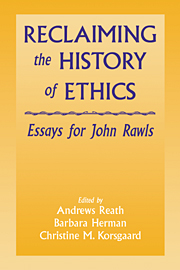Book contents
- Frontmatter
- Contents
- List of Contributors
- Introduction
- Aristotle on the Soul's Conflicts: Toward an Understanding of Virtue Ethics
- Coercion, Ideology, and Education in Hobbes's Leviathan
- The Hobbesian Side of Hume
- The Natural Goodness of Humanity
- Metaphysics, Philosophy: Rousseau on the Problem of Evil
- Within the Limits of Reason
- A Cosmopolitan Kingdom of Ends
- Legislating for a Realm of Ends: The Social Dimension of Autonomy
- Kant on the Objectivity of the Moral Law
- Kantian Virtue: Priggish or Passional?
- Taking the Law into Our Own Hands: Kant on the Right to Revolution
- Kant on Aesthetic and Biological Purposiveness
- Kant on Ends and the Meaning of Life
- Community and Completion
Metaphysics, Philosophy: Rousseau on the Problem of Evil
Published online by Cambridge University Press: 04 November 2009
- Frontmatter
- Contents
- List of Contributors
- Introduction
- Aristotle on the Soul's Conflicts: Toward an Understanding of Virtue Ethics
- Coercion, Ideology, and Education in Hobbes's Leviathan
- The Hobbesian Side of Hume
- The Natural Goodness of Humanity
- Metaphysics, Philosophy: Rousseau on the Problem of Evil
- Within the Limits of Reason
- A Cosmopolitan Kingdom of Ends
- Legislating for a Realm of Ends: The Social Dimension of Autonomy
- Kant on the Objectivity of the Moral Law
- Kantian Virtue: Priggish or Passional?
- Taking the Law into Our Own Hands: Kant on the Right to Revolution
- Kant on Aesthetic and Biological Purposiveness
- Kant on Ends and the Meaning of Life
- Community and Completion
Summary
The desire to become the “Newton of the mind” was an understandable eighteenth-century aspiration. It may be less understandable that Kant awarded the honor to the philosopher whose writings seem closest to literature, and even more surprising that he does so because of Rousseau's response to a problem that seems closest to theology.
Newton was the first to see order and regularity combined with great simplicity, where disorder and ill-matched variety had reigned before. Since then comets have been moving in geometric orbits. Rousseau was the first to discover in the variety of shapes that men assume the deeply concealed nature of man and to observe the hidden law that justifies Providence. Before them, the objections of Alfonso and the Manicheans were valid. After Newton and Rousseau, God is justified, and Pope's thesis is henceforth true.
The present essay seeks to understand just what Kant meant in this unpublished note. Initial study of Rousseau's writings on the subject will raise more questions than it answers. For where Rousseau seems to be addressing the traditional problem of evil, he is conventional, even reactionary; where his work is interesting, and revolutionary, he seems to be addressing different questions altogether. Thus it may be unsurprising that this extraordinary note is seldom quoted in full, and that requests to explain it rarely produce more than the apologetic suggestion that the remark is, after all, pre-Critical. In trying to appreciate Kant's claim, I examine Rousseau's discussion of the problem of evil and his role in transforming that problem in several directions.
- Type
- Chapter
- Information
- Reclaiming the History of EthicsEssays for John Rawls, pp. 140 - 169Publisher: Cambridge University PressPrint publication year: 1997
- 4
- Cited by

